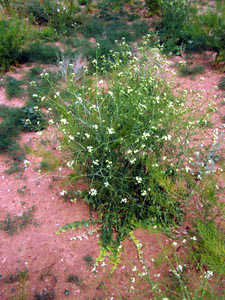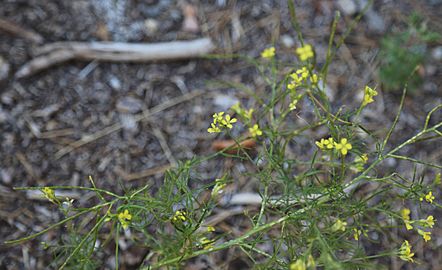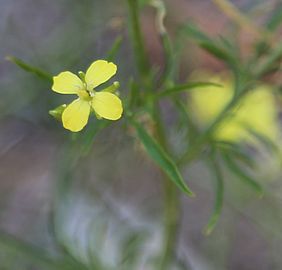Sisymbrium altissimum facts for kids
Quick facts for kids Sisymbrium altissimum |
|
|---|---|
 |
|
| Scientific classification |
|
| Kingdom: | Plantae |
| Clade: | Tracheophytes |
| Clade: | Angiosperms |
| Clade: | Eudicots |
| Clade: | Rosids |
| Order: | Brassicales |
| Family: | Brassicaceae |
| Genus: | Sisymbrium |
| Species: |
S. altissimum
|
| Binomial name | |
| Sisymbrium altissimum |
|
| Script error: The function "autoWithCaption" does not exist. | |
Script error: No such module "Check for conflicting parameters".
Sisymbrium altissimum is a type of plant often called Jim Hill mustard or tumble mustard. It is known for becoming a tumbleweed when it gets old. This plant originally came from the western part of the Mediterranean area. Now, you can find it growing in many places around the world, including all of North America.
Contents
What Does It Look Like?
Tumble mustard plants can grow quite tall, up to about 1.5 meters (5 feet) high. They have thin stems with many branches, making them look delicate.
Leaves and Flowers
The leaves on the stem are divided into thin, long parts. But the leaves closer to the ground are wider and have many smaller parts, like a feather. The flowers are small, only about 0.6 centimeters (1/4 inch) wide. They usually have four yellow petals and four narrow, curved sepals.
Seeds and Life Cycle
After the flowers, the plant grows long, slender seedpods that are about 5 to 10 centimeters (2 to 4 inches) long. The plant usually starts growing in winter or early spring. It blooms for a long time. When the plant is fully grown, it dies. Then, it breaks off from its roots and rolls around in the wind, spreading its seeds everywhere. This is how it becomes a tumbleweed!
Plant Names
The common name 'Jim Hill mustard' comes from a story about James J. Hill. He was a powerful man who built railroads in Canada and America. Farmers used to tell a story that the seeds of this plant were spread along his railroad tracks.
Where It Grows
This plant first grew in the western Mediterranean area, which includes parts of Europe and Northern Africa. Over time, it spread and now grows naturally in many parts of the world, including all of North America. It probably came to North America mixed in with seeds of other crops.
Plant Habitat
Tumble mustard can grow in many different kinds of soil, even sandy soil. It is very adaptable!
How People Use It
The leaves of the tumble mustard plant are quite spicy. You can use them to make something like wasabi, or you can mix them into salads and other dishes.
See also
 In Spanish: Sisymbrium altissimum para niños
In Spanish: Sisymbrium altissimum para niños
 | Sharif Bey |
 | Hale Woodruff |
 | Richmond Barthé |
 | Purvis Young |



